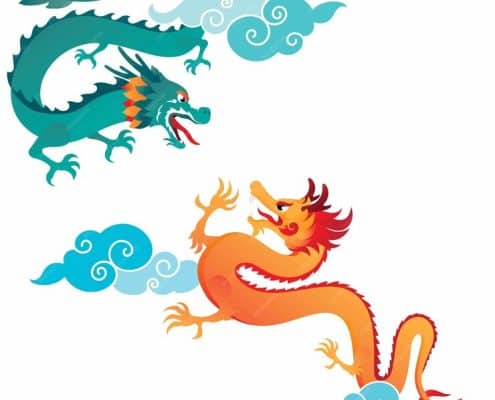12 Chinese Idioms About Dragons

Dragon is the fifth animal out of twelve in the Chinese zodiacs. The Year 2024 is the year of the wood dragon. There are five elements in the Chinese cosmology: earth, wood, metal, fire, and water.
Enrich your Chinese classes by learning some interesting idioms about dragons. Here are five Chinese idioms about dragons:
人中之龙
rén zhōng zhī lóng
Literal: A dragon among men.
A metaphor for a hero among people.
叶公好龙
yè gōng hào lóng
Literal: Ye Gong loves dragons (Ye Gong was a noble of Chu in the Spring and Autumn period).
A metaphor for saying you like something but actually not really liking it.
二龙戏珠
èr lóng xì zhū
Literal: Two dragons playing with pearls.
Two dragons facing each other, playing with an orb.
画龙点睛
huà lóng diǎn jīng
Literal: Drawing a dragon with their eyes.
A metaphor for using a few points to make contents vivid and powerful when writing articles or making speeches.
鱼龙混杂
yú lóng hùn zá
Literal: Fishes and dragons mixing
A metaphor for saying good people and bad people mix together.
笔走龙蛇
bǐ zǒu lóng shé
Literal: The brush moves as dragons and snakes.
Describing a calligraphy that is vivid grand.
生龙活虎
shēng lóng huó hǔ
Literal: Born a dragon and live as a tiger.
Describing someone who is lively and energetic.
龙生九子
lóng shēng jiǔ zǐ
Literal: A dragon that gives birth to nine sons.
A metaphor for brothers who have different qualities and hobbies.
鱼跃龙门
yú yuè lóngmén
Literal: A fish leaping over the dragon gate.
A metaphor for a career success or a rising status.
望子成龙
wàng zǐ chéng lóng
Literal: Hoping that your son will become a dragon.
Describing parents who hope their children can achieve academic and career success.
龙飞凤舞
lóng fēi fèng wǔ
Literal: Flying dragon dancing phoenix
Originally used to describe the winding and majestic mountains. Later it used to describe powerful calligraphy strokes.
神龙见首不见尾
shénlóng jiàn shǒu bùjiàn wěi
Literal: To see a heavenly dragon’s head but not its tail.
A metaphor for someone who disappears as soon as they appear. It is also a metaphor for one’s flickering words, making them unpredictable.


